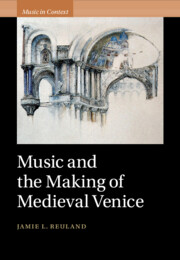Book contents
- Music and the Making of Medieval Venice
- Music in Context
- Music and the Making of Medieval Venice
- Copyright page
- Dedication
- Contents
- Figures
- Maps
- Tables
- Music Examples
- Acknowledgments
- Manuscript Sigla
- A Note on Dating
- Abbreviations
- Introduction
- Part I An Audible Empire
- Part II The Fictive City
- Part III Relics and the Horizons of Musical Representation
- 4 Narrative Fragments
- 5 History Lessons
- 6 Sound Documents
- Epilogue
- Book part
- Bibliography
- Index
5 - History Lessons
Matins for the Apparition of Saint Mark’s Relics
from Part III - Relics and the Horizons of Musical Representation
Published online by Cambridge University Press: 12 October 2023
- Music and the Making of Medieval Venice
- Music in Context
- Music and the Making of Medieval Venice
- Copyright page
- Dedication
- Contents
- Figures
- Maps
- Tables
- Music Examples
- Acknowledgments
- Manuscript Sigla
- A Note on Dating
- Abbreviations
- Introduction
- Part I An Audible Empire
- Part II The Fictive City
- Part III Relics and the Horizons of Musical Representation
- 4 Narrative Fragments
- 5 History Lessons
- 6 Sound Documents
- Epilogue
- Book part
- Bibliography
- Index
Summary
Chapter 5 shows how the text–music relationships in the Matins office for the feast of Saint Mark’s Apparition supported the construction of narrative history. Unlike the public-facing office of Vespers, the night office of Matins—an enormous and lengthy complex of readings, psalmody, and chant—offered a robust formal structure on which narrative history could be built up and elaborated. An analysis of the chants and readings from the Matins office reveals the composer’s careful curation of source material and inventive use of the conventional melodic features of mode and melody, showing just how much craft went into the representation of miraculous history in a liturgical format. The composer’s reliance on the technical and medium-specific tools of chant to make Mark “appear” within the office suggests that such formal devices served as viable substitutes for, or representations of, the miraculous. The office itself seems to argue that good storytelling, whether accomplished on the page or in plainchant, could produce miracles merely at the level of form and technique.
- Type
- Chapter
- Information
- Music and the Making of Medieval Venice , pp. 156 - 190Publisher: Cambridge University PressPrint publication year: 2023

